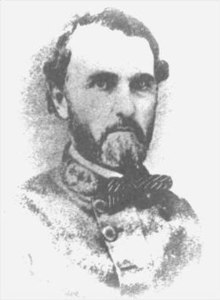St. John Richardson Liddell
This article needs additional citations for verification. (October 2019) |
St. John R. Liddell | |
|---|---|
 | |
| Born | September 6, 1815 Wilkinson County, Mississippi |
| Died | February 14, 1870 (aged 54) New Orleans, Louisiana |
| Place of burial | Llanada Plantation Cemetery, Jonesville, Louisiana |
| Allegiance | |
| Service/ | |
| Years of service | 1861–1865 |
| Rank | Brigadier General |
| Commands held | Arkansas Brigade Liddell's Division Sub-District of North Louisiana |
| Battles/wars | American Civil War |
St. John Richardson Liddell (September 6, 1815 – February 14, 1870) was a prominent Louisiana planter who served as a general in the Confederate States Army during the American Civil War. He was an outspoken proponent of Southern emancipation of slaves. Following the war, Liddell had a prominent feud with a former Confederate officer, Charles Jones, who eventually murdered Liddell near his home in 1870.
Early life
Liddell was born to a wealthy
He attended the
Civil War
Western Theater: 1861–63
With the outbreak of the
Liddell commanded a division at
Trans-Mississippi Theater: 1863–65
General Bragg refused to spare Liddell, but when Bragg was relieved by Jefferson Davis after the Chattanooga disaster, Liddell appealed personally to the President for a transfer and command of
During his Trans-Mississippi service, Liddell found himself in conflict with his immediate superior,
Liddell on slavery
Liddell held a reputation for being outspoken, and was well connected. In December 1864, he wrote a letter to Edward Sparrow, a Confederate Senator from Louisiana and chairman of the military Committee, expressing his conviction that the war was going against the Confederacy. He expressed the need for full emancipation of the slaves in order to secure foreign assistance. Although he admitted it may have been too late to act, he felt that emancipation may have also been a solution to the South's growing manpower crisis. Senator Sparrow showed the letter to General Robert E. Lee, who agreed with Liddell on all points, stating that "he could make soldiers out of any human being that had arms and legs."
Postbellum career
In 1866, Liddell wrote his memoirs, in which he was highly critical of the Confederate leadership and his fellow officers, including Davis and Bragg. The memoirs themselves are actually a collection of several separate manuscripts, letters, and battlefield records, which he was unable to combine before he was murdered.
In them, his criticisms arise mainly from the failure of Bragg's subordinates, including Cleburne,
He mentions several times the growing sense of futility he and other officers felt in the unlucky Army of Tennessee. It was plainly clear to them after the fall of Forts Henry and Donelson that their cause was doomed unless they could concentrate their forces and wage an offensive campaign; however, political intrigue always seemed to squander any gains made by the army. Liddell comes off as a fair, impartial officer, even proposing that had the south recruited generals like
Liddell refused promotion, and endeavored to help any officer he was assigned to, regardless of whether they were liked or not. He was opinionated and outspoken, yet his opinion was valued and he held the ear of the echelons of Confederate command, including Davis, A.S. Johnston, Bragg, and Hardee. He spent his vast personal fortune on equipping his own brigade, even though it was from a different state. The brigade itself was the only unit in the Army of Tennessee never to court-martial an enlisted soldier.
Liddell was murdered in 1870 by Col. Charles Jones in the culmination of a twenty-year real estate dispute. He was buried on his sprawling plantation in Louisiana. Jones was later murdered by supporters of Liddell in revenge for his death.
The St. John Richardson Liddell Chapter #271 of the
See also
- List of American Civil War generals (Confederate)
- Moses J. Liddell was the oldest son of St. John Richardson Liddell and was appointed as a territorial justice of territory of the Montana Supreme Court.
Notes
- ^ "Fort McDermott:"The Men Dig,Dig,Dig"". Historical Marker Database. Retrieved 25 September 2015.
References
- Andrews, C. C. History of the Campaign of Mobile. New York, 1867.
- Anonymous. "The Jones-Liddell Feud." Unpublished Manuscript. Catahoula Parish Court House, Harrisonburg, La.
- Booth, Andrew B. Records of Louisiana Confederate Soldiers and Louisiana Confederate Commands. 3 colvs. New Orleans, 1920.
- Busbice, Roger L. "Catahoula Parish Rebel, Gen. St. John R. Liddell," North Louisiana History 15 (Winter 1984), pp. 49–52
- Connelly, Thomas L. Autumn of Glory: The Army of Tennessee 1862–1865. Baton Rouge: Louisiana State University Press, 1971. ISBN 978-0-8071-2738-4.
- Eicher, John H., and ISBN 978-0-8047-3641-1.
- Hughes Jr., Nathaniel C., and Liddell, St. John R., Liddell's Record, Louisiana State University Press, 1997, ISBN 978-0-8071-2218-1.
- ISBN 978-0-87338-486-5. First published Baltimore; The Johns Hopkins Press, 1958.
- Kane, Harnett T. The Bayous of Louisiana. New York, 1943.
- Lanza, Michael L. "The Jones-Liddell Feud." Red River Valley Historical Review II (Winter, 1975), 467ff.
- Maury, Dabney H. Recollections of a Virginian. New York, 1894.
- Richardson, Frank L. "The War as I Saw It, 1861-1865". Louisiana Historical Quarterly, VI (January, April, 1923), 86–106, 223ff.
- ISBN 978-0-8131-9000-6.
- Sifakis, Stewart. Who Was Who in the Civil War. New York: Facts On File, 1988. ISBN 978-0-8160-1055-4.
- United States War Department. The War of the Rebellion: a Compilation of the Official Records of the Union and Confederate Armies. Washington, DC: U.S. Government Printing Office, 1880–1901. OCLC 427057.
- ISBN 978-0-8071-0823-9.
- ISBN 978-0-8071-0834-5.
